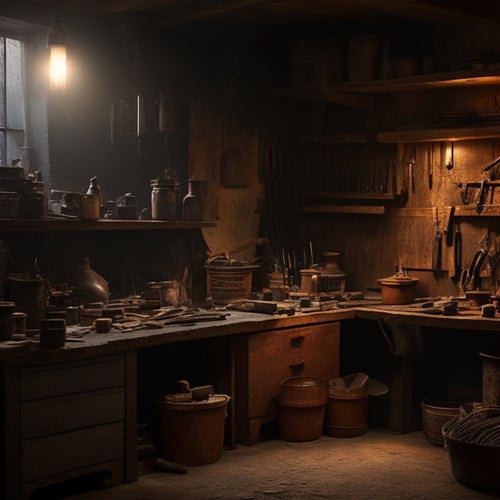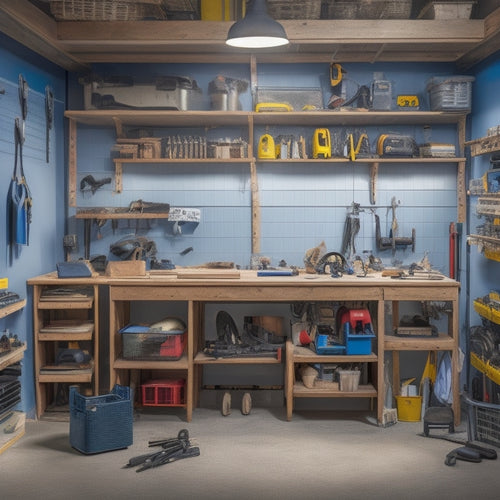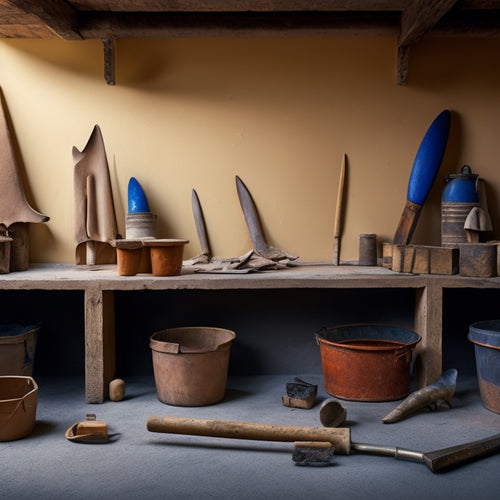
Must-Have Tools for DIY Home Renovation
Share
When tackling a DIY home renovation, you'll need a range of essential tools to get the job done efficiently and effectively. Power tools like cordless drills and impact wrenches will help with heavy lifting, while hand tools like precision screwdrivers and pliers will assist with intricate tasks. Measurement and testing tools, such as tape measures and multimeters, will guarantee accuracy, and safety equipment like hard hats and gloves will protect you from hazards. Specialized tools, like tile cutters and jigsaws, will also be necessary for specific tasks. With these must-haves in your toolkit, you'll be well-equipped to take your project to the next level.
Key Takeaways
• Invest in power tools like cordless drills and impact wrenches for heavy-duty tasks to reduce manual labor and fatigue.
• Equip yourself with precision hand tools like pliers, screwdrivers, and wire cutters for intricate tasks and professional-looking results.
• Ensure accurate measurements with essential tools like tape measures, laser levels, and multimeters to prevent errors and save time.
• Prioritize safety with protective gear like hard hats, safety glasses, and gloves, and maintain a first aid kit for emergencies.
• Specialized tools like jigsaws, tile cutters, and hole saws can simplify complex tasks and improve overall project results.
Power Tools for Heavy Lifting
When tackling heavy-duty DIY projects, you'll rely on power tools to get the job done efficiently. Having the right tools can make all the difference in reducing manual labor and preventing fatigue.
Cordless drills, for instance, are a must-have for drilling and driving screws, offering the convenience of portability and versatility. Look for drills with high-torque motors and adjustable speed settings to tackle various tasks.
Impact wrenches are another essential power tool for heavy-duty projects. These powerful tools can deliver high torque output, making them perfect for loosening stubborn bolts and nuts. When choosing an impact wrench, consider the voltage, weight, and ergonomics to guarantee it fits comfortably in your hand and provides the necessary power.
Always follow safety guidelines when operating power tools, wearing protective gear like safety glasses and gloves to prevent accidents.
Hand Tools for Precision Work
Your hand tool arsenal should include precision instruments like needle-nose pliers and lineman's pliers, which provide the finesse and control necessary for intricate tasks, such as bending and shaping small objects or reaching into tight spaces.
These tools will help you achieve the finishing touches on your DIY project, ensuring a professional-looking result. When selecting hand tools, look for ergonomic designs that fit comfortably in your hand, reducing fatigue and strain. This is especially important for tasks that require precision and control, as a comfortable grip will improve your accuracy.
In addition to pliers, you'll want to include tools like precision screwdrivers, wire cutters, and strippers in your arsenal.
These tools will allow you to tackle tasks like electrical work, plumbing, and HVAC installation with confidence. Remember to choose tools that are durable and built to last, as they'll be essential for completing a wide range of tasks.
Measurement and Testing Essentials
You'll need to guarantee accuracy and precision in your DIY home renovation project by incorporating measurement and testing tools that provide reliable data and insights. These tools will help you confirm that every cut, drill, and installation is precise, saving you time, money, and frustration.
Here are some essential measurement and testing tools to evaluate:
| Tool | Function | Benefits |
|---|---|---|
| Tape Measures | Measure distances, widths, and heights | Accurate measurements, easy to use, compact |
| Laser Levels | Ensure level and plumb lines | Precise leveling, reduces errors, increases efficiency |
| Multimeters | Measure electrical voltage, current, and resistance | Ensures safe electrical work, troubleshoots issues, provides accurate readings |
Safety Equipment for Protection
By incorporating essential safety equipment into your DIY home renovation arsenal, you're better equipped to prevent accidents and protect yourself from potential hazards. Safety should always be your top priority, especially when working with power tools, electrical systems, and hazardous materials.
Invest in high-quality protective gear, such as hard hats, safety glasses, earplugs, and dust masks, to shield yourself from falling debris, flying particles, and loud noises.
Develop and follow strict safety protocols to minimize risks. Make sure you have a first aid kit on hand and know how to respond to emergencies. Keep a fire extinguisher nearby and know how to operate it.
Wear steel-toed boots, gloves, and long-sleeved shirts to protect your skin from cuts, abrasions, and chemical splashes.
Set up a well-ventilated workspace to prevent the buildup of toxic fumes. By taking these precautions, you can greatly reduce the risk of injury and create a safer working environment.
Specialized Tools for Specific Tasks
As you tackle specific tasks in your DIY home renovation project, having the right specialized tools at your disposal can greatly improve efficiency, accuracy, and overall results.
For instance, when working with complex cuts or curved lines, specialty saws like jigsaws or reciprocating saws can make all the difference. These saws provide more precision and control, reducing the risk of errors and ensuring a professional finish.
When it comes to tiling, tile cutters and nippers are essential for achieving accurate cuts and minimizing waste. These tools allow you to make precise cuts and fit tiles together seamlessly, resulting in a beautiful and durable finish.
Additionally, having the right drill bits and hole saws can simplify tasks like installing lighting fixtures or plumbing fixtures.
Frequently Asked Questions
How Do I Organize My Tools to Maximize Workshop Space?
To optimize your workshop space, you'll want to prioritize tool storage.
Start by evaluating your tool collection and categorizing items by frequency of use.
Then, design a workshop layout that allocates zones for specific tasks, like a dedicated area for power tools or a workstation for hand tools.
Install shelving, bins, and hooks to keep tools off the floor and within easy reach, ensuring a safe and efficient work environment.
Can I Use Batteries Across Different Tool Brands?
When it comes to using batteries across different tool brands, you'll want to exercise caution. While some brands share similar battery platforms, others don't.
Check the voltage, ampere-hour rating, and connector type to guarantee compatibility. Be aware that mixing batteries can lead to poor performance, damage, or even safety risks like overheating or electrical shock.
Always consult the manufacturer's guidelines and follow proper safety protocols to avoid any potential hazards.
What Is the Best Way to Clean and Maintain My Tools?
As you wield your trusty hammer like a medieval knight, remember that tool care is key to a victorious DIY campaign.
Create a maintenance schedule to regularly inspect and clean your tools. Wipe down metal surfaces with a soft cloth and mild soap, and lubricate moving parts to prevent rust.
Store them in a dry place, away from direct sunlight. By doing so, you'll guarantee your tools remain in top condition, ready to conquer your next project.
How Do I Determine the Quality of a Tool Before Purchasing?
When buying a tool, you need to determine its quality before making a purchase.
Start by researching tool brand comparisons to find out how different brands stack up against each other.
Next, read user reviews from multiple sources to get a sense of the tool's performance and durability.
Look for red flags like frequent breakdowns or poor customer support.
Are There Any DIY Home Renovation Apps Worth Using?
When tackling a DIY project, you'll want to stay organized and on top of tasks. That's where DIY renovation apps come in.
You'll find project management tools that help you create to-do lists, track progress, and even collaborate with contractors. Look for apps that offer features like budget tracking, material calculators, and tutorials.
Some popular options include HomeZada, Planner 5D, and RoomSketcher. These apps will help you stay safe and focused, ensuring your renovation project turns out exactly as planned.
Conclusion
As you begin your DIY home renovation journey, remember that having the right tools is essential for success.
With the must-have tools outlined above, you'll be well-equipped to tackle any project.
Did you know that according to the National Association of Home Builders, 77% of homeowners undertake DIY projects, with 63% of them using power tools?
With the right tools and a bit of know-how, you can join the ranks of successful DIY renovators and enjoy the satisfaction of transforming your living space.
Related Posts
-

Why Invest in Quality Plastering Tools for Renovation
When renovating, investing in quality plastering tools is essential for achieving professional-looking results and mi...
-

Why Home Renovators Need Smart Tool Storage Now
You need a smart tool storage system that streamlines your workflow, reduces clutter, and protects your investments b...
-

7 Best Plastering Bat Sizes for DIY Renovations
When tackling DIY renovations, you'll want to choose the right plastering bat size to achieve a professional-looking ...


